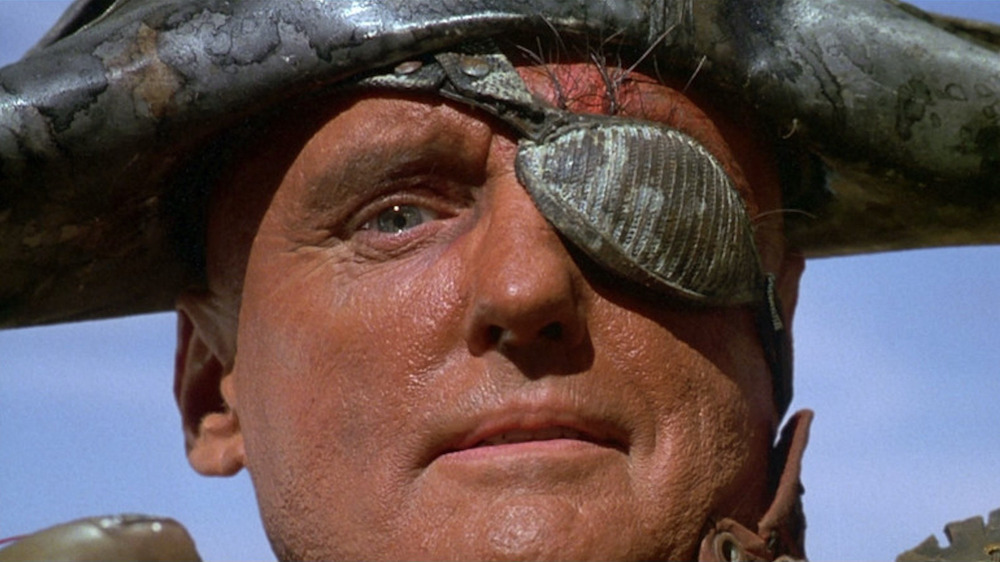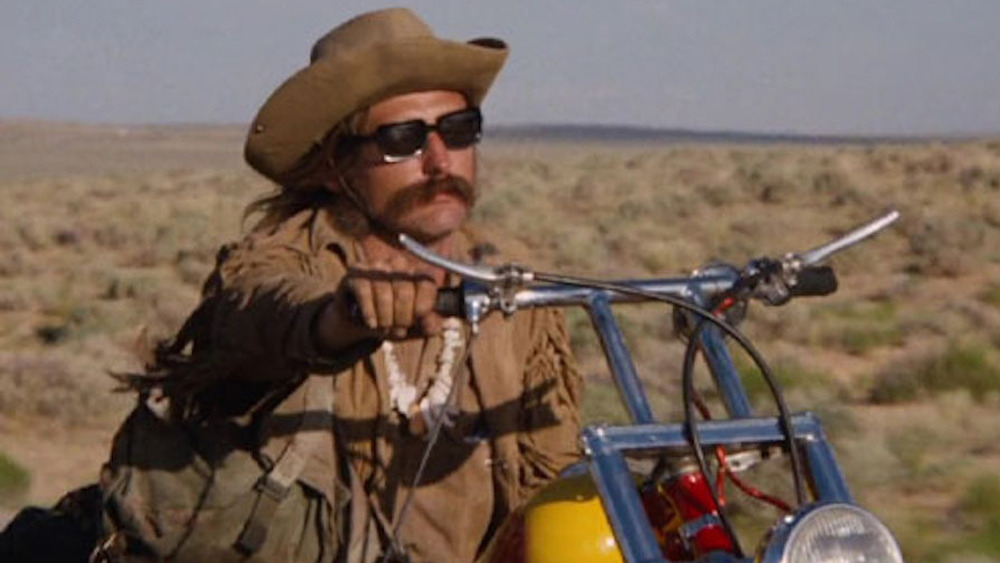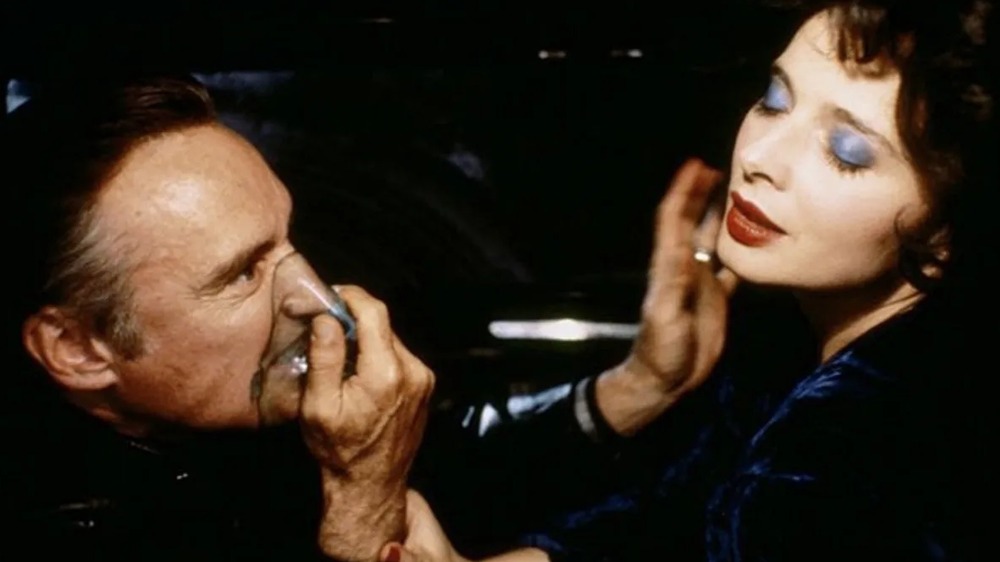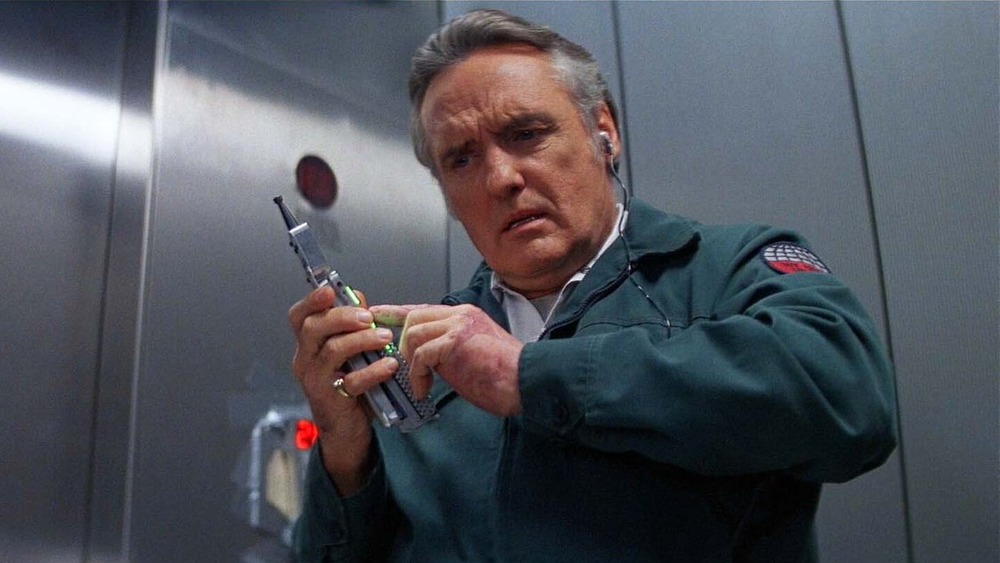Why Deacon From Waterworld Looks So Familiar
As any studio boss can tell you, the very act of making a movie is a major gamble, with even the safest of bets potentially turning into a money-losing flop. And in Hollywood's long history of money-losing flops, few films have ever so notably failed at the box office as Universal Pictures' 1995 Waterworld. Released at the height of the summer movie season, the post-apocalyptic sci-fi spectacular was, at the time, the most expensive ever produced, boasting a whopping $175 million budget. Upon release, however, Waterworld recouped less than half its mammoth budget, making it one of the most notorious busts in cinema history.
Still, Waterworld's unflattering cinematic legacy isn't entirely earned. While most agree the film is deeply flawed, they also agree that for the right sort of viewer, the wildly-original story — about a lone mariner (Kevin Costner) helping a woman (Jeanne Tripplehorn) and her daughter (Tina Majorino) search for dry land, in a world flooded by the melting of the ice caps — is a steam-punky delight with high style, intriguing ideas, and massive set pieces to burn.
It also boasts as wonderfully crazed a band of villainous scum as cinema has ever seen, in the chain-smoking, "go-juice" loving baddies known as the Smokers. And even casual movie lovers no doubt recognized the face of their leader Deacon, because it belongs to the late, great Dennis Hopper, a legit cinematic icon with dozens of classic films to his credit.
Easy Rider made a big screen icon of Dennis Hopper
Most true cineastes will tell you Dennis Hopper actually made his big screen debut opposite James Dean in 1955's counterculture classic Rebel Without a Cause. They'd also tell you he didn't land his legitimate Hollywood breakout until more than a decade later, and that he did so in another iconic slice of counterculture cinema, 1969's sex, drugs, and rock & roll fueled road movie Easy Rider.
Frankly, Easy Rider is essentially the counterculture film to end them all. And in spite of Hopper's notable presence alongside the likes of Peter Fonda and Jack Nicholson, and the film being released theatrically by Columbia Pictures, Easy Rider wasn't exactly a Hollywood affair. In fact, the film was about as independent a production as Hollywood could conjure in the late sixties, with Fonda producing the film on a budget of approximately $400,000, and Hopper himself occupying the director's chair.
Both Fonda and Hopper starred in the film as well, portraying wayward souls who, after scoring big in a drug deal, ride their motorcycles through the Heartland in search of their version of the elusive American dream. Along the way, they encounter hippie communes, indulge in rampant drug use, and eventually meet a tragic end at the hands of some backwoods baddies. But they do so in spectacular fashion, backed by a period-perfect soundtrack of rock & roll anthems, and Hopper imbuing the film in a gritty sense of hyper-realism while delivering one of his strongest performances to boot.
Blue Velvet found Dennis Hopper terrifying the arthouse set
As far as true swing-for-the fences performances go in Hopper's varied oeuvre, few were quite as memorable as his beyond bonkers turn as Frank Booth in David Lynch's neo-noir suburban nightmare Blue Velvet.
If you're unfamiliar with Lynch's 1986 masterpiece, Blue Velvet follows an earnest college student (Kyle McLachlan) who discovers a severed ear in a vacant lot, begins to investigate the matter himself, and is thrust into the orbit of an enigmatic nightclub singer (Isabella Rossellini), and thus that of Hopper's psychotic, hyper-violent, nitrate-huffing underworld boss, who has kidnapped the singer's family and forced her into sex-slavery as ransom.
As you might expect from any David Lynch project, things get seriously weird in Blue Velvet, in often shocking fashion. And you'd better believe Hopper's larger than life performance as Frank Booth is at the center of every maddening moment of Lynch's masochistic psychosexual odyssey, with the actor going big in ways only he seems capable of, and doing so in such convincing fashion his performance is as utterly terrifying as it is completely transfixing. And yes, that makes it arguably the best work of the lauded actor's career.
Dennis Hopper pop-quizzed Keanu Reeves in Speed
Dennis Hopper was truly among the most fiercely independent filmmakers who ever lived. But even as he had a clear affinity for smaller-scaled productions, Hopper was never afraid to indulge in a little blockbuster bombast. Though Hopper's tentpole instincts didn't always pan out for the best (see 1993's atrocious adaptation of Super Mario Bros), the actor scored the biggest box office hit of his career when he claimed a supporting role opposite Keanu Reeves and Sandra Bullock, in a high-octane thriller by the name of Speed.
Now, names like Reeves and Bullock obviously carry serious weight in Hollywood these days, but in 1994, neither was yet boasting their current superstar status. As it was, Dennis Hopper may well have been the biggest name in Speed prior to its premiere, with the actor even earning second billing only to Keanu Reeves in the film's promotional materials.
That obviously changed once the tale of a mad bomber hijacking a bus full of passengers via a speed-sensitive bomb hit theaters and became one of 1994's biggest hits, putting both of Hopper's esteemed co-stars on the path to superstardom in the process. And there's little question that Reeves and Bullock are the stars of Speed's patently absurd, yet wildly entertaining show. Still, Hopper's villainous turn as the hyper-intelligent bad boy bomber tormenting them at every turn is as giddily menacing as any he delivered from the nineties until the end of his career.



